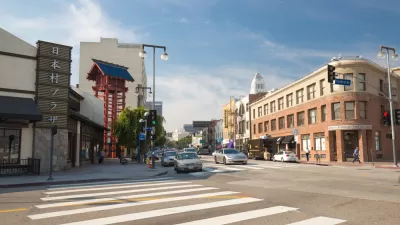The Los Angeles City Council voted to officially end the use of Level of Service in measuring environmental impact in favor of a more people-friendly measure: vehicle miles traveled.

Joe Linton reports from Lo Angeles, where the City Council recently approved a substantial change to environmental review in accordance with the California Environmental Quality Act (CEQA).
Linton describes the consequences of choosing LOS as the primary measure of a development project's impact:
LOS is a way of measuring traffic, though it perniciously and simplistically only measures car traffic, and doesn’t even do that meaningfully. Measuring for LOS shows any project that increases car congestion – such as building new housing – as adversely impacting the environment. To supposedly fix congestion – the adverse environmental impact of that new housing – LOS measurements end up requiring more space for cars, so a housing project might also have to widen the road. LOS incorrectly assumes that car traffic is a static quantity, denying the effects of induced travel. LOS said that the 405 Freeway would be less congested after it was widened. That didn’t happen.
The change from LOS to VMT was mandated by SB 743, a law approved by the state of California in 2013. Several cities in the state have already made the switch, including Pasadena and San Francisco. Outside of the state, Seattle is also working on reforming its use of Level of Service as a measure of development impact mitigation.
For more details on the effort by the city of Los Angeles to replace LOS analysis with VMT, see also a post by Steven Sharp from February 2019.
FULL STORY: Big Wonky Good News: L.A. City Adopts People-Centered Transportation Metric: “VMT” In, “LOS” Out

Planetizen Federal Action Tracker
A weekly monitor of how Trump’s orders and actions are impacting planners and planning in America.

Map: Where Senate Republicans Want to Sell Your Public Lands
For public land advocates, the Senate Republicans’ proposal to sell millions of acres of public land in the West is “the biggest fight of their careers.”

Restaurant Patios Were a Pandemic Win — Why Were They so Hard to Keep?
Social distancing requirements and changes in travel patterns prompted cities to pilot new uses for street and sidewalk space. Then it got complicated.

Platform Pilsner: Vancouver Transit Agency Releases... a Beer?
TransLink will receive a portion of every sale of the four-pack.

Toronto Weighs Cheaper Transit, Parking Hikes for Major Events
Special event rates would take effect during large festivals, sports games and concerts to ‘discourage driving, manage congestion and free up space for transit.”

Berlin to Consider Car-Free Zone Larger Than Manhattan
The area bound by the 22-mile Ringbahn would still allow 12 uses of a private automobile per year per person, and several other exemptions.
Urban Design for Planners 1: Software Tools
This six-course series explores essential urban design concepts using open source software and equips planners with the tools they need to participate fully in the urban design process.
Planning for Universal Design
Learn the tools for implementing Universal Design in planning regulations.
Heyer Gruel & Associates PA
JM Goldson LLC
Custer County Colorado
City of Camden Redevelopment Agency
City of Astoria
Transportation Research & Education Center (TREC) at Portland State University
Camden Redevelopment Agency
City of Claremont
Municipality of Princeton (NJ)




























